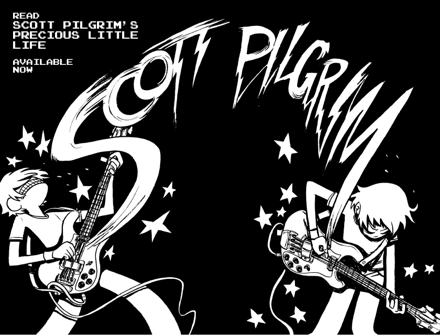"Peter Parker is the ideal man. He's smart, he's funny, and he always at least TRIES to do the right thing. Plus, thanks to Marvel's publishing schedule, we get to see each other pretty much every week."Alison Lynn, friend of mine and Clare's, said those words the night I met her. Of course, Peter Parker holds a few points over most other guys by simple merit of being fictional. He can do and be lots of things us regular joes can't. Like be in fourteen places at the same time in a given week. Scott Pilgrim is far less reliable by comparison. He only dropped into our lives six times somewhat randomly over the course of six years. Does that make him more special by reason of being scarce? I'm not sure.

What I do know is the two hold a great deal of similarities between them. Think about it: Male, main character. Great responsibility... fucks up a lot. Beautiful girl to fight for. Special abilities that force him into an unusual situation. In the end the only difference between these two lovable losers is secrecy and spandex.
The release of Edgar Wright's adaptation film "Scott Pilgrim vs. The World" has come and gone and the world didn't exactly explode over it. Its box office gross was considered a disappointment by most and although the film was really well-crafted and is already a beloved film among many (including the writers of this blog), it probably isn't going to spawn a billion other indie graphic novel film adaptations.
However another friend of Clare's and mine has been telling me about an ongoing experiment she's conducting with the residents that, as an RA, are under her stewardship. Rachel Altvater shares with The Long and Shortbox Of It a bit about people at her college dipping into comics:
I went to see the movie with two guys from my staff who hadn't read the books, and they both really liked the movie. I encouraged them to read the books, and one of them was skeptical because they were "comics." When I referred to them as "graphic novels," he jumped at the chance to borrow "Precious Little Life."
...
The guy from my staff said that he'd never read a graphic novel before, and he was liking it so far. He said that "Precious Little Life" was "really good...it just kinda sucks you in, and it looks just like the movie so far."
...
The person who came to possess my copy of "Precious Little Life" seems to be a lost cause. I can't even get the book back from him.
Josh's latest post proves this to be even more true as a friend of his picked up a copy of "Scott Pilgrim's Precious Little Life" without prompting of any kind at an unrelated college event.
People love Scott Pilgrim even more than they love Spidey.
Actually, there's also a lot of Charlie Brown in the character as well as Peter Parker. And maybe even some of the late, great Harvey Pekar in there? Could Scott Pilgrim's appeal be essentially that he is a loser with a good and stout heart? And we all see a bit of ourselves in him?
If so, I have never seen such proof that humans like to read about lovable losers because the "Scott Pilgrim" series is currently the most successful graphic novel series in America's history. As Clare said to me: "Bryan Lee O'Malley doesn't need to publish anything else for the rest of his life. And neither does Oni Press." At the very least, THAT makes me giddy as a school-girl because if it's really true, it means that one of America's most inventive comicsmiths and one of America's most varied comics publishers have carte blanche to do what feels right, to take chances, and throw caution to the wind.

Truly, as far as I'm concerned, if even one person discovers a few comics they wouldn't have otherwise I'm glad the adaptation was made. And more money in the bank for creators and publishers during this tough economic time is a good thing. That could be the real legacy of the "Scott Pilgrim" film: the bankroll it brought to a creative comicsmith and a publishing house.
~ @JonGorga
P.S. ~ From bios and other public sources, I understand that Bryan Lee O'Malley (@radiomaru) and Hope Larson (@hopelarson) have been in a committed relationship for some time. So... would it be weird to point out that makes two young creative comicsmiths who both work often with Oni Press (@OniPress) with room to grow and money to burn?
Because this gives me hope for the entire medium, and the future of the American popular graphic novel form.









.jpg)




